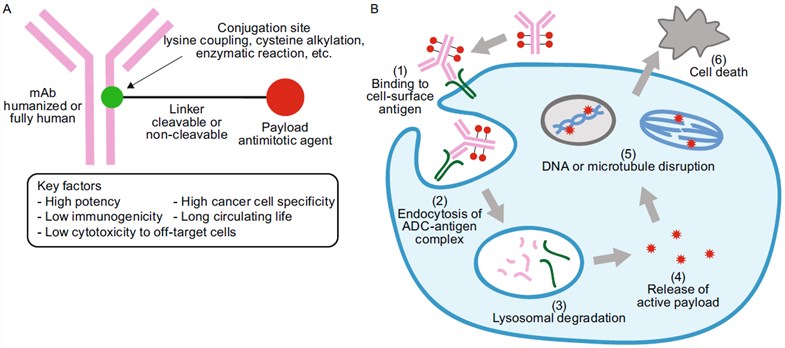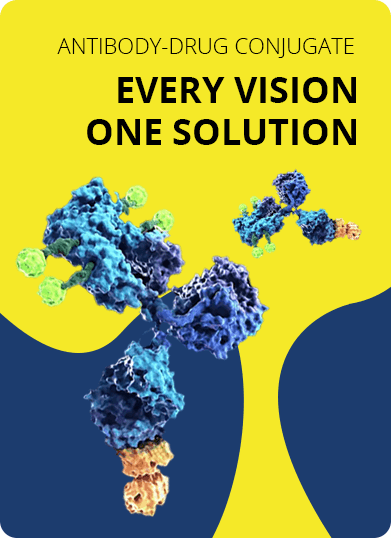- Home
- Applications
- Liver Carcinoma
ADC Development Services for Liver Carcinoma Research
Liver carcinoma or hepatocellular carcinoma (HCC) is the fifth most frequent malignancy and the second leading cause of cancer-related death in the world. It is one of the solid organ malignancies resistant to conventional chemotherapy causing the weak outcome. Thus, some novel treatment strategies have emerged to improve the curative effect of Liver carcinoma patients, such as Antibody-drug conjugates (ADCs).
Creative Biolabs is a biotechnology company committed to developing ADCs for a variety of cancer therapy. Our complete ADCs construction services include the production of specific antibody, the synthesis of effective linker-payload and optimized bioconjugation strategy to obtain qualified ADCs. Various stocked products related to ADCs are also avaliable.
Introduction of Liver Carcinoma
HCC is a type of cancer arising from the liver cells. The cancer is divided into several subtypes including hepatocellular carcinoma, intrahepatic cholangiocarcinoma and hepatoblastoma. Hepatocellular carcinoma is the most common type of liver cancer. Generally, the symptoms of cancer include unexplained loss of weight, loss of appetite, upper abdominal pain, nausea and vomiting, weakness and fatigue, abdominal swelling and jaundice. Some cases of liver cancer are associated with chronic hepatitis infections, but sometimes the cause of the disease is unclear. Risk factors of this cancer include chronic viral hepatitis infection, cirrhosis, inherited liver diseases, diabetes, nonalcoholic fatty liver disease, exposure to aflatoxins and excessive alcohol consumption. Currently, treatments for HCC include surgery, localized treatments, radiation therapy, targeted drug therapy, chemotherapy and immunotherapy, which rely on the stage of the disease, patient’s age, overall health and personal preferences.
Current Therapeutic Strategies for HCC
Treatment for HCC depends on the extent of the disease, and traditional therapeutic options often include surgical resection, liver transplantation and locoregional therapy. Cytotoxic chemotherapy may be used in some individuals with underlying noncirrhotic liver, because systemic chemotherapy is usually not well tolerated by patients. Sorafenib represents the standard frontline therapy, which is a multiple kinase inhibitor repressing the activity of Raf-1 and other tyrosine kinases, and it is the first targeted therapy approved for the treatment of advanced HCC in patients.
Currently, immunotherapy strategies have been introduced for HCC treatment, aiming to selectively target tumor cells by activating a tumor-specific immune response. For example, the immune-checkpoint-pathway inhibitor anti-cytotoxic T-lymphocyte antigen 4 (CTLA-4) antibody (ipilimumab) has been designed for the treatment of patients with advanced HCC , which showed promising outcomes. Besides, an anti-PD-1 antibody with a high affinity to PD-1 is investigated in a phase I study for patients with advanced HCC. Other immunotherapeutic strategies have been developed based on the identifying of tumor-associated antigens (TAAs) to enhance host immunity to the HCC.
Oncolytic virotherapy as a new anticancer strategy has been developed. Some of the oncolytic virus platforms are being tested in clinical trials for HCC patients currently. The oncolytic vaccinia virus pexastimogene devacirepvec (Pexa-Vec, JX-594), armed with granulocyte-macrophage colony-stimulating factor (GM-CSF)-expressing genes, is representative oncolytic virotherapy for HCC treatment.
 Fig.1 Structure and mechanism of action of ADC.1,2
Fig.1 Structure and mechanism of action of ADC.1,2
Target of ADC development for HCC:
Creative Biolabs is an biotech company focusing on the ADCs development. We integrate deep-rooted biological expertise with our comprehensive bio-conjugation technologies to rapidly design and advance a pipeline of ADC drugs targeting tumors. We believe our comprehensive ADCs preparation services will promote your drug discovery project progress. For more details and information, please feel free to contact us.
References
- Tsuchikama, Kyoji, and Zhiqiang An. "Antibody-drug conjugates: recent advances in conjugation and linker chemistries." Protein & cell 9.1 (2018): 33-46.
- Distributed under Open Access License CC BY 4.0, without modification.
For Research Use Only. NOT FOR CLINICAL USE.

Online Inquiry
Welcome! For price inquiries, please feel free to contact us through the form on the left side. We will get back to you as soon as possible.
